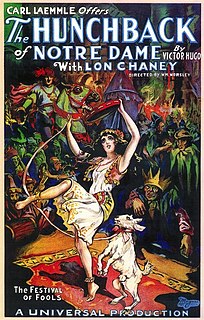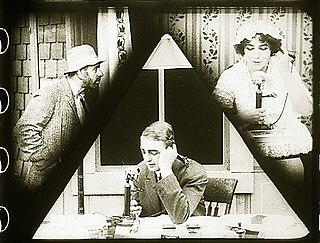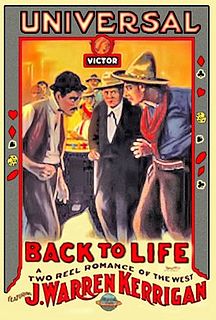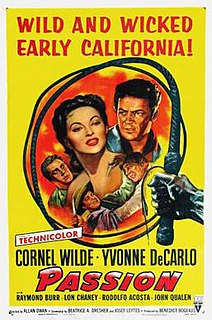Related Research Articles
The year 1914 in film involved some significant events, including the debut of Cecil B. DeMille as a director.

William Wallace Halleck Reid was an American actor in silent film, referred to as "the screen's most perfect lover". He also had a brief career as a racing driver.

The Hunchback of Notre Dame is a 1923 American drama film starring Lon Chaney, directed by Wallace Worsley, and produced by Carl Laemmle and Irving Thalberg. The supporting cast includes Patsy Ruth Miller, Norman Kerry, Nigel de Brulier, and Brandon Hurst. The film was Universal's "Super Jewel" of 1923 and was their most successful silent film, grossing $3.5 million. The film premiered on September 2, 1923 at the Astor Theatre in New York, New York, then went into release on September 6.

The Miracle Man is a 1919 American silent drama film starring Lon Chaney and based on a 1914 play by George M. Cohan, which in turn is based on the novel of the same title by Frank L. Packard. The film was released by Paramount Pictures, directed, produced, and written by George Loane Tucker, and also stars Thomas Meighan and Betty Compson. The film made overnight successes of the three stars, most notably putting Chaney on the map as a character actor.

Pauline Elvira Bush was an American silent film actress. She was nicknamed "The Madonna of the Movies".
The Honor of the Family is a 1912 American silent short drama film produced by the Rex Motion Picture Company. The film is a melodramatic one between two brothers and a woman named Marja. Gerald admires the girl and warns his visiting brother, Claude, to leave her alone. Infatuated, Claude and Marja secretly marry before Claude returns to England with a promise to return for her. As the months pass, Marja becomes broken-hearted and attempts suicide, but ends up crippled for life. Claude dies and Gerald cares for Marja, even forging a letter to keep her spirits up. Marja comes to love Gerald and all is revealed on a later date.

Suspense is a 1913 American silent short film thriller directed by Lois Weber and Phillips Smalley. Weber also wrote the scenario and stars in the film with Valentine Paul. The film features early examples of a split screen shot and a car chase. The Internet Movie Database lists Lon Chaney as having an unconfirmed and uncredited brief role; however, this is disputed by silentera.com, which states "Despite attributions to the contrary, Lon Chaney does not appear in the film."

Shon the Piper is a 1913 American silent short historical romantic drama film directed by Otis Turner and starring Robert Z. Leonard and Lon Chaney. The film follows a Scottish Duke who disguises himself as a piper and falls in love with a woman by the name of Madge. The woman's father refuses to let the two marry because he wants his daughter to marry the Laird of the Isla. At the wedding, Shon steals Madge away and a battle ensues between the clans.

The Restless Spirit is a 1913 American silent short drama film written and directed by Allan Dwan, featuring J. Warren Kerrigan, Lon Chaney, and Pauline Bush. The film is based on Thomas Gray's 1751 poem, Elegy Written in a Country Churchyard, and tells the story of a man who wishes to be a conqueror. A series of illusions follows which show him the futility of conquest when he cannot even conquer his own community.

Back to Life is a 1913 American silent short drama film directed by Allan Dwan and featuring Pauline Bush, J. Warren Kerrigan, William Worthington and Lon Chaney. This was Chaney's first film with director Allan Dwan, which was followed by a dozen more. The film is now considered lost.

Bloodhounds of the North is a 1913 American silent short drama film directed by Allan Dwan and starring Murdock MacQuarrie, Pauline Bush, and Lon Chaney. The film is now considered lost. Some sources state the film was edited down to one reel and re-released theatrically in 1916 as The Accusing Evidence, but this is disputed.
The Lie is a 1914 American silent short western drama film directed by Allan Dwan and featuring Murdock MacQuarrie, Pauline Bush, and Lon Chaney. The film is now considered lost. A still exists from the film showing Chaney as "Young MacGregor".

The Honor of the Mounted is a 1914 American silent short drama film directed by Allan Dwan and featuring Murdock MacQuarrie, Pauline Bush, and Lon Chaney. The film is now considered lost.

Discord and Harmony is a 1914 American silent short romantic drama film directed by Allan Dwan and featuring Murdock MacQuarrie, Pauline Bush, and Lon Chaney. The film's scenario, written by Arthur Rosson, was based on an event experienced by composer Ludwig van Beethoven. The film is now considered lost.
The Menace to Carlotta is a 1914 American silent short drama film directed by Allan Dwan and featuring Pauline Bush, William C. Dowlan, Murdock MacQuarrie and Lon Chaney. It was banned by the censor of Quebec on March 19, 1914. The film is now considered lost. Chaney also wrote the film's scenario. The film's original working title was Carlotta, the Bead Stringer.

The Embezzler is a 1914 American silent short drama film directed by Allan Dwan and featuring Lon Chaney, Pauline Bush and Murdock MacQuarrie. The film is now considered lost. A still exists showing Chaney in the J. Roger Dixon role.
The End of the Feud is a 1914 American silent drama film directed by Allan Dwan and featuring Murdock MacQuarrie, Pauline Bush, and Lon Chaney. The film is now considered lost.
Richelieu is a 1914 American silent Historical drama film written and directed by Allan Dwan, based on the play "Richelieu" written by Edward Bulwer-Lytton. It featured Lon Chaney, Murdock MacQuarrie and Pauline Bush. This was Allan Dwan's last film for Universal, as he moved to New York afterward to work at the Famous Players Company and married his lead actress Pauline Bush in 1915.
Accusing Evidence is a 1916 American silent Western film directed by Allan Dwan and starring Lon Chaney, Pauline Bush and Murdock MacQuarrie.

Passion is a 1954 American Western film directed by Allan Dwan and written by Howard Estabrook, Beatrice A. Dresher and Joseph Lejtes. The film stars Cornel Wilde, Yvonne De Carlo, Raymond Burr, Lon Chaney Jr., Rodolfo Acosta and John Qualen. The film was released on October 6, 1954, by RKO Pictures.
References
- ↑ Reid, Wallace (April 19, 1913), The Ways of Fate , retrieved June 10, 2016
- ↑ "The Moving Picture World (Apr-Jun 1913) (Apr-Jun 1913)". New York, Chalmers Publishing Company. 1913. p. 204. Retrieved September 4, 2014.
- ↑ "The Moving Picture World (Apr-Jun 1913) (Apr-Jun 1913)". New York, Chalmers Publishing Company. 1913. pp. iii. Retrieved September 4, 2014.
- 1 2 3 "The Motion Picture Story Magazine (Feb-Jul 1913) (Feb-Jul 1913)". The Motion Picture Publishing Co. 1913. p. 1064. Retrieved September 4, 2014.
- 1 2 3 4 5 6 7 Fleming, E. J. (October 25, 2013). Wallace Reid: The Life and Death of a Hollywood Idol. McFarland & Company. p. 244. ISBN 9780786482665 . Retrieved September 4, 2014.
- 1 2 Lon Chaney: A Thousand Faces (DVD). Warner Home Video. 2000.
- ↑ Quinlan, David (1983). The Illustrated Guide to Film Directors. Rowman & Littlefield. pp. 52–53, 84. ISBN 9780389204084.
- ↑ Rainey, Buck (1992). Sweethearts of the sage: biographies and filmographies of 258 actresses appearing in western movies. McFarland & Company. p. 61.
- ↑ Lombardi, Frederic (2013). Allan Dwan and the Rise and Decline of the Hollywood Studios. McFarland & Company. pp. 24–26. ISBN 9780786434855 . Retrieved January 12, 2015.
- ↑ "The Moving Picture World (Apr-Jun 1913) (Apr-Jun 1913)". New York, Chalmers Publishing Company. 1913. p. 123. Retrieved September 4, 2014.
- ↑ "Moving Picture News (Jan-Jun 1913) (Jan-Jun 1913)". Cinematograph Publishing Company. 1913. p. 478. Retrieved September 4, 2014.
- ↑ "Today's Pictures". The Washington Herald (Washington, District of Columbia). April 19, 1913. p. 13. Retrieved September 4, 2014.
- ↑ "(New Mehesy Theater Ad)". The Salt Lake Tribune (Salt Lake City, Utah). April 20, 1913. p. 29. Retrieved September 4, 2014.
- ↑ "(Oxford Theater Ad)". The Evening Standard (Uniontown, Pennsylvania). April 24, 1913. p. 1. Retrieved September 4, 2014.
- ↑ "(The Airdome Ad)". The Eagle (Bryan, Texas). May 10, 1913. p. 5. Retrieved September 4, 2014.
- ↑ "(The Oread Theater Ad)". Lawrence Daily Journal-World (Lawrence, Kansas). May 16, 1913. p. 5. Retrieved September 4, 2014.
- ↑ "At The Eagle". The High Point Enterprise (High Point, North Carolina). June 5, 1913. p. 4. Retrieved September 4, 2014.
- ↑ "(The Bijou Ad)". Greensboro Daily News (Greensboro, North Carolina). June 6, 1913. p. 6. Retrieved September 4, 2014.
- ↑ "Opera House Tonight". The Neosho Daily News (Neosho, Missouri). August 7, 1913. p. 4. Retrieved September 4, 2014.
- ↑ "(Theater Ad)". The Winnipeg Tribune (Winnipeg, Manitoba, Canada). April 25, 1913. p. 6. Retrieved September 4, 2014.
- ↑ The Moving Picture World, Volume 17, Issues 1-6. Chalmers Publishing Company. 1913. p. 51.
- ↑ Mirsalis, Jon. "The Not Chaney Filmography: Films Attributed to Lon Chaney That He Did Not Appear In". Lon Chaney.org. Retrieved September 4, 2014.
- ↑ Blake, Michael (1997). A Thousand Faces: Lon Chaney's Unique Artistry in Motion Pictures. Vestal Press. pp. 18–30. ISBN 9781461730767 . Retrieved September 4, 2014.
- ↑ Abel, Richard (2005). Encyclopedia of Early Cinema. Taylor & Francis. p. 20. ISBN 9780415234405 . Retrieved September 4, 2014.
- ↑ "The Ways of Fate". Silent Era. Retrieved January 9, 2015.